Secret files: Declassified documents reveal rocky road to peace
- Published
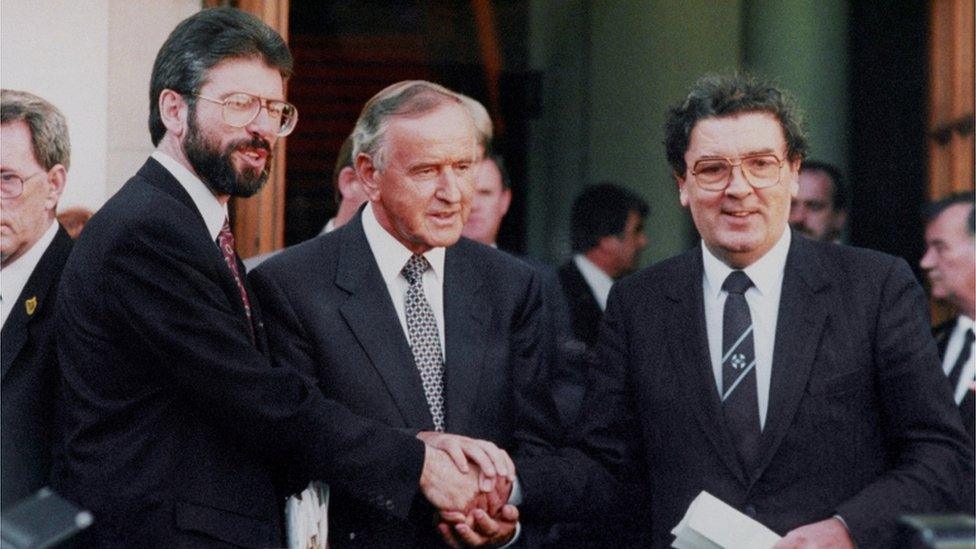
British officials saw the 1994 meeting between Gerry Adams, Albert Reynolds and John Hume (L-R) as an example of "indecent haste"
Declassified government papers show there were serious tensions between the British and Irish governments over their responses to the paramilitary ceasefires of the 1990s.
The detail is contained in previously confidential documents released by the Public Record Office in Belfast.
They show how the then Tánaiste (Irish deputy prime minister) Dick Spring felt the British government was too slow with the process of demilitarisation.
Speaking in 1995 at an Anglo-Irish conference, Mr Spring stressed the Irish government's view on the need for a "rapid and visible response" by the security forces to the new situation.
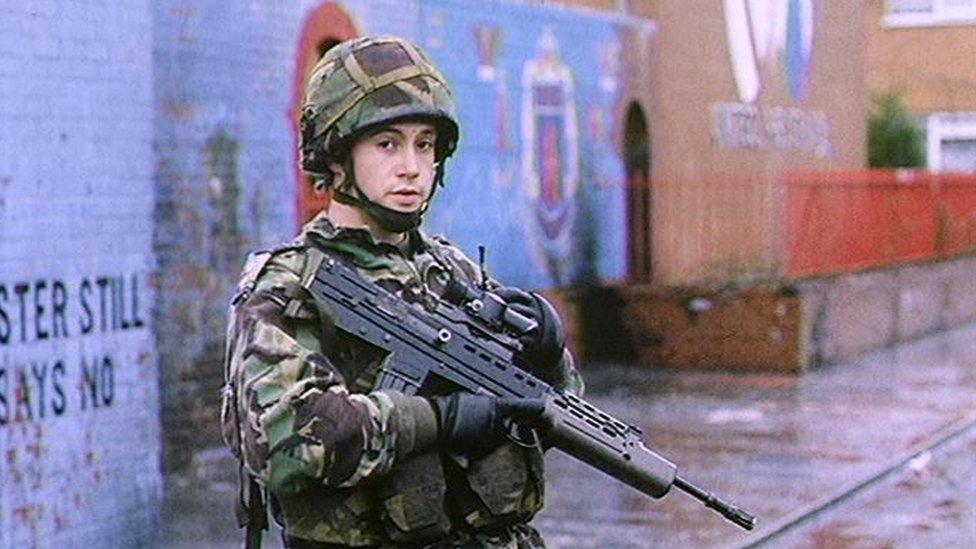
The Irish government felt the withdrawal of troops from the streets of Northern Ireland was proceeding too slowly
He welcomed recent moves, including the ending of military patrolling and troop withdrawals.
However, he spoke of "a growing sense among the nationalist community that [the British government's] response was unduly cautious".
The then Royal Ulster Constabulary (RUC) Chief Constable Sir Hugh Annesley was "taken aback" by Mr Spring's view that demilitarisation should proceed more rapidly.
The files also reveal that a senior civil servant in the Northern Ireland Office (NIO) was critical of the then Taoiseach (Irish Prime Minister) Albert Reynolds' famous public hand-clasp with the Sinn Féin president, Gerry Adams, SDLP leader John Hume at Government Buildings in Dublin on 6 September 1994.
The official wrote that the meeting was "widely believed to reflect indecent haste although clearly designed to tie Adams into a process from which he personally would not be able to escape".
Historian Dr Eamon Phoenix, who has examined the documents, said decommissioning was the key issue of the time.
He said the Irish and the British governments took different approaches to the loyalist and republican ceasefires.

The decommissioning of paramilitary weapons became the key issue following the ceasefires
The papers reveal there were serious differences behind the scenes, he told BBC News NI.
He said Prime Minister John Major was "talking about the permanency of decommissioning and questioning the permanency which irritated John Hume, Gerry Adams and the Irish government and of course Sinn Féin itself so we are into this whole kind of blame game".
Dr Phoenix said the reports show how difficult "it was to build trust and peace particularly between republicans and the British government".
He added that the documents reveal that building peace "is difficult and is going to take a very long time to deliver".
The reports, released on Friday, also give details of behind-the-scenes meetings over the issue of the decommissioning of paramilitary weapons.
The documents detail the minutes of the first meeting at Parliament Buildings, Stormont, on 9 December 1994 between a Sinn Féin delegation, led by the late Martin McGuinness, and a team of NIO officials, headed by the Permanent Under-Secretary of the NIO, Quentin Thomas, which run to 34 pages.
One report from December 1994 quotes the Northern Ireland Secretary Patrick Mayhew saying "all the paramilitary structures (including armaments) remain in place and we are now in a tricky phase until we establish whether the republican movement and loyalists are definitely committed to democratic politics".
The files also reveal Mr Major was worried about the impact of troop reductions in Northern Ireland on Tory backbenchers. The prime minister was reliant on Ulster Unionist votes at Westminster.
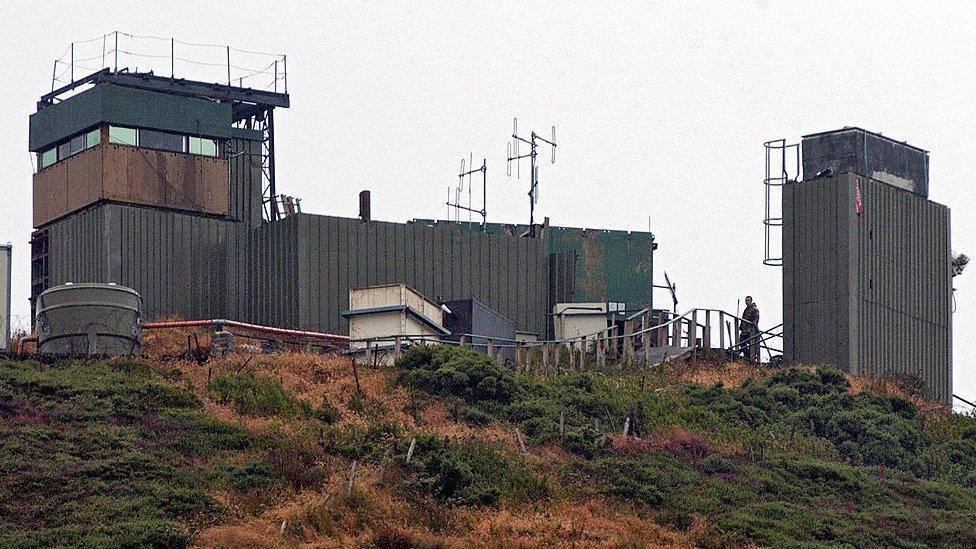
During the Troubles the border was peppered with unsightly security installations and watchtowers
The previously confidential documents also show that the Northern Ireland Tourist Board (NITB) suggested asking the European Union to help fund the redesign of border security checkpoints.
The issue was raised with the British government by the chairman of the NITB, Sir Hugh O'Neill, on 9 May 1990.
Writing to the NIO under-secretary, Richard Needham, Sir Hugh expressed concern at "the intimidating appearance of the surface entry points into NI from the Republic".
Mr Needham indicated that a refurbishment programme had been agreed costing £50,000 per checkpoint.
Noting that most visitors entered Northern Ireland from the Republic of Ireland, Sir Hugh asked if more could be done on the border "so as to give a more friendly welcome to the visitor".
He also suggested the government should seek European Union funding to assist in the landscaping of the checkpoints.
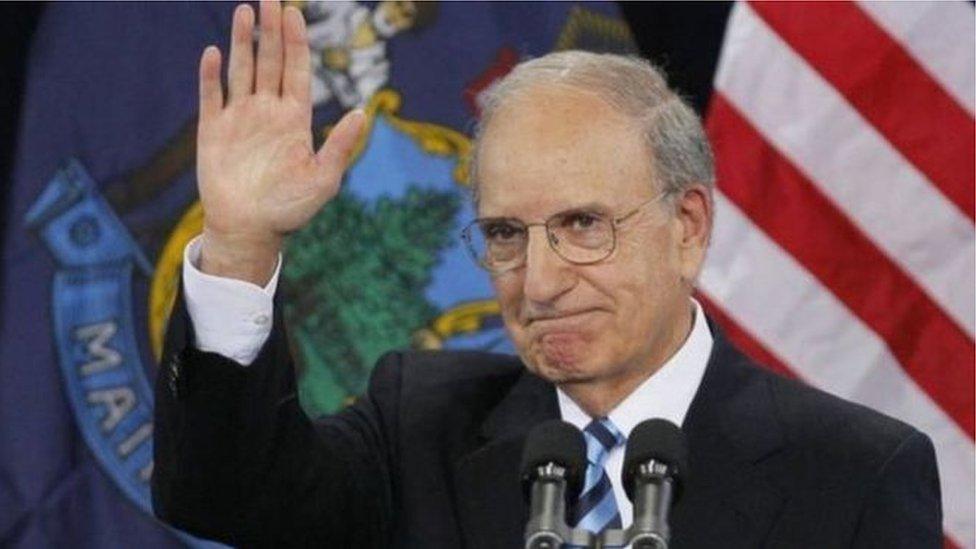
Former US Senator George Mitchell chaired the talks that led to the signing of the 1998 Good Friday Agreement
The documents also show that in 1993 the British government rejected United States President Bill Clinton's plan to appoint an Irish peace envoy.
Two years later, former US Senator George Mitchell was appointed special envoy. He was later to chair the talks that led to the Good Friday Agreement of 1998.
The papers also reveal that a plan by a senior NIO official that the Queen might mark the ending of violence in NI after the 1994 ceasefires by sending a message to Irish President Mary Robinson to mark St Patrick's Day was rejected on grounds of unionist sensitivity.
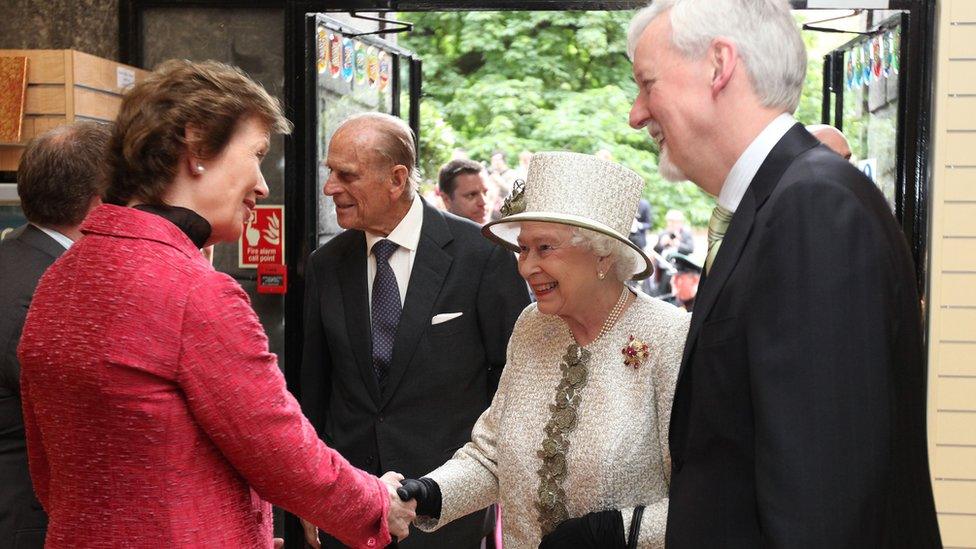
The fuss over a St Patrick's Day greeting did nothing to sour relations between the Queen and Mary Robinson (seen here at a later meeting)
One NIO official wrote that a message from the Queen to President Robinson would be "a gain" for the British side, but added: "I doubt if many unionists would see it that way".
The final word was left to Mr Mayhew. In a memo on 6 March 1995, he expressed the view that "it was less sore-making to maintain the practice of silence" towards the Irish president.